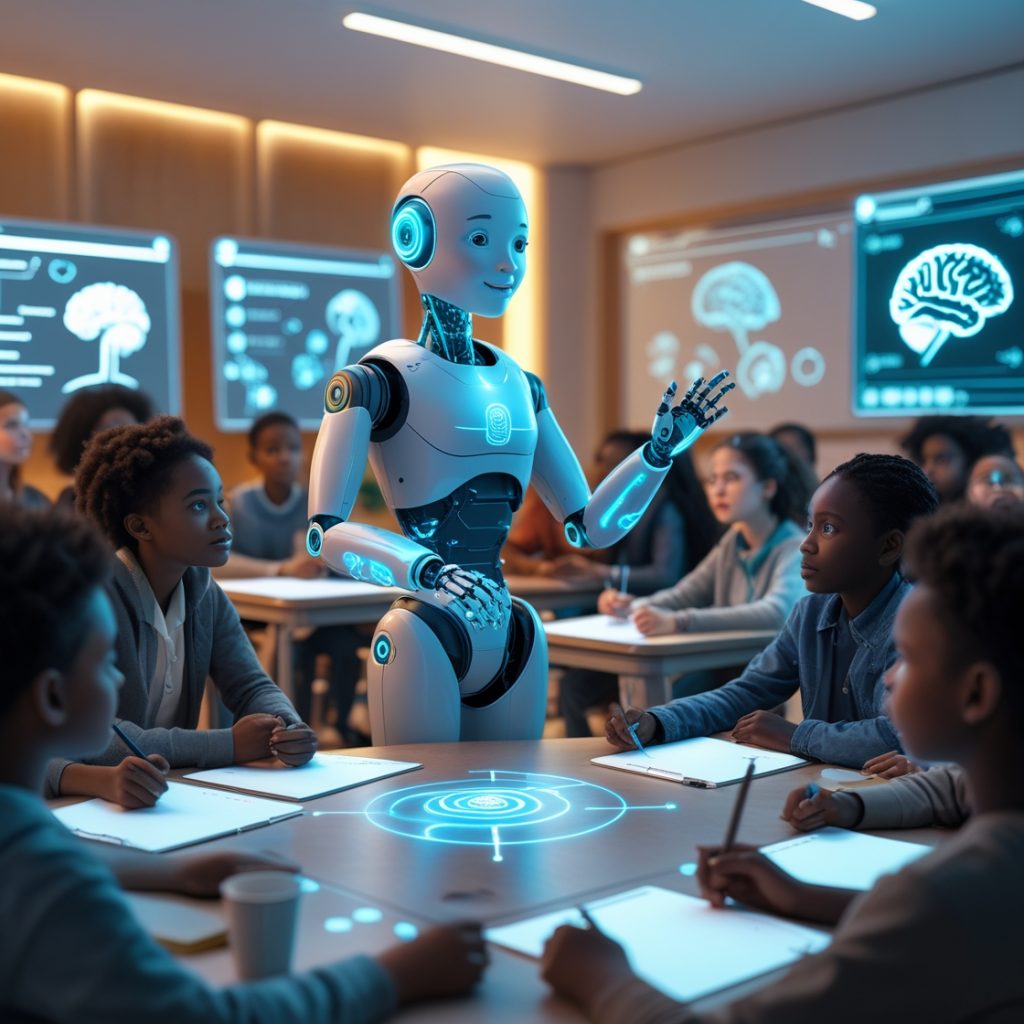
Top 10 Exclusive Importance of AI in Education
Introduction
You can imagine a classroom where every student would have their own teacher inside the classroom who teaches them personally based on learning needs and speed. A classroom where all students get instant feedback about their academic progress and no one is left behind. Today Artificial Intelligence (AI) is turning the previous educational impossibility into a reality. The importance of AI in education is evident as it functions as an educational tool in the current era by providing specific educational content, immediate performance assessments and data evaluation results.
Artificial Intelligence is impacting and revolutionizing our learning procedures, this applies to both students in grade school and adult learners developing their personal skills. Modern education depends on its data analysis capabilities and automated processes that make it a fundamental aspect of contemporary teaching methods. The landscape of education now experiences a fundamental change through AI technology while this article examines its essential value for education and its results for students and educators.
What is Artificial Intelligence in Education
Artificial Intelligence in education refers to the application of machine learning algorithms, data analysis and cognitive computing systems to improve teaching efficiency and educational value.
The educational field employs artificial intelligence through systems that provide smart tutoring as well as systems that provide automated grading, virtual assistant support and personalized learning platforms. The importance of AI in education can be seen in AI-based chatbots that help students with their questions, track performance, and enhance learning through data analytics systems.
Open educational systems with AI technology provide students with an improved learning environment beyond automated service provision. Students and teachers find empowerment through technology because it creates teaching experiences which are accessible, efficient and interactive.

The Importance of AI in Modern Learning
Education through traditional methods faces difficulties in serving students’ varied academic requirements because of the rapid pace of the modern world. Professionals in education dedicate themselves to provide quality education despite the fact that regular teaching methods fail to deliver solutions for individual students. This is where AI steps in.
The importance of AI in education is evident in modern learning, as this technology enables customized learning approaches that adapt to individual needs. The assessments of student actions combined with their educational achievements alongside their material usage lead AI systems to provide actionable teaching orientations. The result produces better student involvement and enhances academic results together with superior educational encounters.
Educational institutions gain cheap scalable solutions with help from AI technologies. Under AI-powered learning platforms, remote learners can access excellent educational content that are normally unavailable to them. The ability of AI technology goes beyond individual learning improvement because it enables distribution of quality education across all social levels thereby creating universal learning opportunities worldwide.
AI assist teachers so they can save time on administrative work. It also enables teachers to put more of their time to teaching along with mentoring by performing administrative assignments and instant student performance reports. The automation of administrative tasks means that teachers can have enough time to engage with students and encourage them to be creative, think critically and solve difficult problems.
10 Importance of AI in Education
1. Personalized Learning Experiences
One of the biggest aspects of the importance of AI in education is personalization, allowing AI to establish a new level of customized learning practice. AI monitoring allows curricular adjustments to occur and lessen plans with each student’s specific learning requirements. Artificial intelligence adapts educational material to specific student needs and adjusts instructional speed for success in individual concepts. Each student gets the necessary support through an individualized approach which prevents any student from being left without assistance. The personalized learning method increases the motivation of student since it allows them to be in control of their education.
2. Improved Learning Outcomes
The application of AI technologies functions as a key element which drives better student academic achievements. AI analyzes Realtime data to create a comprehensive understanding of student abilities and difficulties by measuring their performance. Teachers benefit from this information by developing specific educational support programs to fill knowledge gaps. The ability of AI systems to track student academic growth leads students to continuous progress which results in enhanced learning results and retention of information for a long time.

3. Accessibility for All Students
Artificial intelligence technology creates educational opportunities for students who have disabilities and students with unique challenges. AI delivers useful tools which includes, speech recognition software that enables students affected by visual impairments and learning disabilities to participate fully in academic learning. A system powered by AI provides easier access to education for students who speak languages other than the standard curriculum because AI translates materials into additional languages. Through AI, every student gets premium educational assistance that suits their original background and cognitive abilities.
4. Automation of Administrative Tasks
The implementation of artificial intelligence provides educational organizations with software solutions that is used for multiple administrative duties starting from grading assignments to class scheduling and standard student inquiries. The automated system saves time for educators which enables them to put more of their effort to teaching duties while reducing their paperwork responsibilities. AI systems improve management efficiency by restructuring the process of classroom activities with their ability to manage student data. Students together with their teachers benefit from AI because it decreases administrative demands in educational settings.
5. Real-Time Feedback
The most beneficial aspect of educational applications built with AI is its automated immediate response system. Students benefit from immediate grading through AI since it provides responses on assignments as well as quizzes and activities. Student can instantly understand where they need help by receiving feedback promptly and this allows them to correct their mistakes immediately, which will make them understand the concepts better. Through this system, teachers can easily discover learning patterns which leads them to address educational problems, thereby creating a better learning environment.
6. Data-Driven Insights for Educators
AI systems help teachers to use all-encompassing data analysis for making wise decisions. Teachers can adjust their instructional techniques using performance measurements from student data alongside behavioral records and engagement patterns that AI extracts from the system. AI platforms detect student learning needs by highlighting students in need of extra support together with the best learning materials and essential instruction topics. The data analysis through this approach lets teachers restructure their teaching methods thereby achieving better educational results for their students.
7. Enhancing Engagement with Interactive Learning
Educational content accessibility through AI-enabled interactive learning tools, now allows students to have advanced ways of interacting with information. The training tools allow students to interact while they practice real-world applications from their learned knowledge. This combination leads students to have a good learning comprehension while improving their knowledge memorization and achieving more satisfying learning experiences.
8. Global Access to Quality Education
Computing technology enables universal access to education across all geographical areas through its implementation. Links between AI-powered remote learning systems enable students from isolated areas to receive top-tier education which normally exceeds their capacity to reach. The technology provides equal scholarship opportunities to students located anywhere because of their ability to learn from expert instructors through this platform. The role of AI stands in creating educational equality which leads to the development of a global learning community.
9. Support for Teachers
The teaching profession benefits strongly from artificial intelligence which delivers strategic tools to assist instructors in delivering better teaching results. By revealing successful instructional methods for some particular students, instructional personnel can both enhance their teaching methods and improve classroom management.
10. Promoting Lifelong Learning
Users now benefit from increased accessibility toward lifelong learning because of AI-powered learning platforms. Artificial intelligence systems assist older students to learn new skills so they can improve their understanding or change their professional direction. AI technology provides customized immediate educational possibilities which enable people to learn beyond the boundaries of conventional educational institutions. Modern learning cultures require continuous development which meets the essential requirements of today’s work environment that requires both upskilling and reskilling abilities.
Conclusion
The importance of AI in education is transforming learning by delivering customized experiences, automating administrative tasks and supporting teachers. The use of artificial intelligence brings numerous benefits to both education and administrative automation and supports teachers thereby transforming the way we teach and learn. Technological advancement will make AI play an important role in education to create new opportunities for building an adaptive educational system that includes all students.
Education benefits from artificial intelligence at a much higher rate than its setbacks that involve data privacy issue and training needs. Proper implementation along with ongoing innovation will make artificial intelligence serve as a catalyst for creating a more hopeful learning environment which promotes equality worldwide.
The question is: How will we ensure that AI is implemented ethically and effectively to truly benefit every student, teacher, and educational institution?

FAQs
Q1: How does AI improve personalized learning?
The tracking system of AI monitors students’ progress and adjusts learning paths based on their individual needs. It ensures that content is given to each learner’s pace, strengths and weaknesses This approach helps students increase their engagement and achievement.
Q2: Can AI replace teachers in the classroom?
AI is not meant to replace teachers in the classroom, but to support them. It assists by automating tasks, providing Realtime feedback and offers personalized learning tools which allows educators to focus more on teaching and mentoring students
Q3: What are the ethical concerns associated with AI in education?
Ethical concerns include data privacy, the potential for AI bias and to ensure that AI doesn’t undermine human interaction in education. It is very necessary to address these issues through transparent policies and responsible AI use to maintain trust and equity.
Q4: Is AI technology affordable for all schools?
The initial expense for acquiring AI technology remains high but new affordable AI toolsets are entering the market especially for digital education platforms. As AI adoption grows, the costs are likely to decrease and this makes these technologies more accessible to schools of all sizes.
Q5: Why is the importance of AI in education increasing?
The importance of AI in education is growing because it allows learners of all ages to access personalized, flexible learning experiences. It offers on demand educational content that helps adults get new skills, improve their knowledge and stay competitive in the job market.
For more Resources for Educational reference








